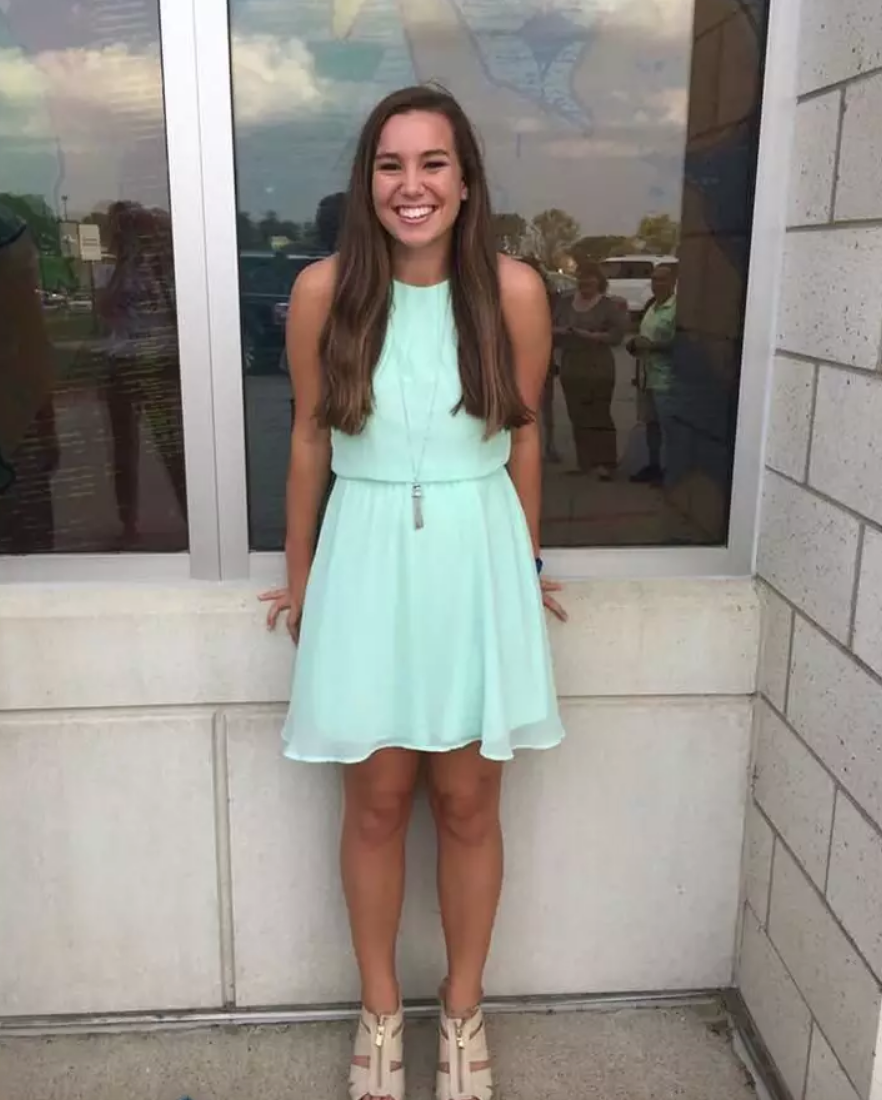The town of Brooklyn, Iowa, sits atop rising hills just off of Interstate 80, flanked on either side by Iowa City and Des Moines. Brooklyn, which has a population of 1,400, looks not unlike many other microscopic towns in America: Littered throughout the single street that pierces through the heart of Brooklyn is a small deli, an abandoned opera house, and an antique store. After the grain elevator, the largest buildings in town are all churches. The only other notable building is John Wayne‘s childhood home.
This is where 20-year-old Mollie Tibbetts was jogging on July 18th, the last time anyone remembers seeing her. The search for Tibbetts, propelled by concerned family and community, ballooned across the state and into the national news and carried on for over a month. When Tibbetts was reported missing, the corn stalks on the outskirts of town stood shoulder high. On August 21st, when her body was found with multiple stab wounds in a nearby field, covered by corn leaves, the stalks seemed impossibly tall.
The suspect charged with the murder of Tibbetts is Cristhian Bahena Rivera, a young man who had spent several years working for local farmers. When news broke that he was being charged with Tibbetts’ murder, Bahena Rivera was described in headlines as “undocumented” and “illegal.”
The article announcing the murder charges of an undocumented immigrant appeared on the in Des Moines Register‘s website at 8:29 a.m. By 4:21 p.m. Iowa’s Republican governor, Kim Reynolds, released a statement that spent time bemoaning the country’s immigration apparatus. “As Iowans, we are heartbroken, and we are angry,” she said. “We are angry that a broken immigration system allowed a predator like this to live in our community, and we will do all we can bring justice to Mollie’s killer.” Reynolds’ statement was subsequently echoed by the state’s two Republican senators.
On the evening of August 21st, a day that saw both the indictment of Paul Manafort on various fraud charges and Michael Cohen’s guilty plea to separate instances of fraud, the top story on the homepage of Fox News was on Bahena Rivera’s immigration status. Days later, President Donald Trump spoke in Columbus, Ohio, and painted Tibbetts’ murder as a result of the Democratic Party’s lax immigration regulations.
The calls for more punitive immigration from conservative politicians, while swift and predictable, did not go unchallenged. But it wasn’t righteous anger from the usual corners of the media landscape or the democratic faithful that led the charge against those who were martyring Tibbetts’ death for the cause of harsher immigration policy. It was her family, and their desire to grieve in peace.

The evening Tibbetts’ body was discovered, conservative pundit and Turning Point USA communications director Candice Owens took to Twitter to accuse leftists of grieving more for immigrants separated from their children (in reference to the ongoing separation of families at the Mexican border) than for Tibbetts and her family. Samantha Lucas, Tibbetts’ second cousin and a recent graduate from the University of Missouri, responded in anger. In a tweet now retweeted more than 112,000 times, she pushed back against Owens’ narrative and the general politicization of her cousin’s death, accusing Owens of being a “fucking snake” for using her cousin’s memory “as political propaganda.”
As with any deceased person, Tibbetts’ personal Facebook page became a memorial site after her death. Among the remembrances that immediately flooded in was one from Jarrett Rose. A common theme that ran through the testimonials for Tibbetts was her ability to form immediate and powerful bonds with people. Rose seemed to have only known her a short period of time, but he had a lot to say.

(Photo: City of Brooklyn, Iowa)
At first reticent to discuss it when I spoke to him, Rose eventually decided he wanted to address the politicization of Tibbetts’ death. “I find it inappropriate to immediately use Mollie’s story as an excuse to push political agendas,” he says. “I do believe that this tragedy will cause discussions that are important, but if our first reaction as humans is to use the loss of Mollie’s life as a game piece to win a political game, then it shows that we as a people have our priorities in the wrong place.”
As the clamor for blood in the name of Tibbetts grew, family members closer to Tibbetts began to speak out. Calderwood posted again: “Please remember, Evil comes in every color. Our family has been blessed to be surrounded by love, friendship and support throughout this entire ordeal by friends from all different nations and races. From the bottom of our hearts, thank you.” Tibbetts’ father, Rob, gave the eulogy at his daughter’s memorial service on Sunday and used it as an opportunity to push back against the conservative narrative surrounding his daughter, specifically thanking the members of the Iowa Latino community who helped in the search.
“The Hispanic community are Iowans. They have the same values as Iowans,” he said. “As far as I’m concerned, they’re Iowans with better food.”
The memory of Mollie Tibbetts doesn’t solely rely on family and friends for correcting the abuse of her memory. She established her personal beliefs in her Twitter, now a brief account of her time on Earth. She bemoaned the role of white voters in the close election of Doug Jones. She seemed to support Hillary Clinton over Trump. When responding to a video of Trump speaking on the dangers of immigration to the United States, Tibbetts pointed out that the president was “married to an immigrant.”

In Brooklyn, The Classic is about the only place to eat. This isn’t just because it is, technically, the only place to get food in town that doesn’t also sell gas. It feels warm and cheery, fairly empty on a Saturday afternoon. It sits across from the abandoned opera and has a small “For Sale” sign in the corner of the window. You can order pie, ice cream, sandwiches, steaks.
Behind the counter, five or six women wait to help with whatever you need. One of them is a young woman with blonde hair, bright orbs for eyes, effervescent. She went to high school with Mollie Tibbetts, was a grade below her, knew her through extracurricular speech and debate activities. Her name is Emily Gus.
“I think people should let her rest and stop making it about them,” she says when asked about her classmate. “They should stop making it about them and their political views.”
She looks off out the storefront window. “I wish Brooklyn was getting attention for having too many flags or something,” referencing the Community of Flags, a display of flags representing each of the 50 states. “Not for something that’s causing me to lose sleep at night.”

(Photo: Angelo Mercado/Flickr)
Despite the amplification and media attention the various family, friends, and community members have received in their attempt to douse the effigy conservatives have built of Mollie Tibbetts’ name, to some extent the damage has been done.
The police labeling Bahena Rivera as undocumented and the widespread reference to him as such, or as “illegal” in some cases, in the media has become his defining attribute in most reports on the murder across many media outlets with varying political leanings. His lawyer disputes the undocumented label and contends that his client is in the U.S. legally. The farm where he worked admitted that he obtained employment with false documents. Bahena Rivera’s lawyer has since withdrawn from his case.
Rhetoric pinning the death of Tibbetts to an undocumented immigrant has an immediate effect on the material reality of immigrants living in Iowa with or without the documentation that the law demands. In a state that has already passed laws banning sanctuary cities and has seen the execution of high-profile Immigration and Customs Enforcement raids, the Latino community could now be under even greater scrutiny. The news of Tibbetts’ murderer allegedly being an undocumented immigrant prompted a last-minute campaign to nominate Patrick Anderson, an evangelical Christian and Republican lawyer, to run against the unopposed democratic candidate for attorney general. Anderson and his supporters were prompted by Tibbetts’ death to nominate an attorney general candidate who would “uphold the immigration laws,” but he feel short of the 1,500 signatures required to get on the ballot.
Two Latino festivals—one in Iowa City in the other in the smaller town of Perry—were canceled in response to the political implications being raised in Tibbetts’ death. Manny Galvez, organizer of the Iowa City festival, claims that it was out of fear. “No one at this festival was going to be prepared for any kind of incident. People are scared,” he says.
In the wake of Tibbetts’ death, people have also reported receiving robocalls tied to a white nationalist organization based in Idaho. The calls reportedly claim that “the body of 20-year-old Mollie Tibbetts was found in a cornfield after she was stabbed to death by an invader from Mexico.” Spray-painted messages that read “Deport Illegals” have also been sighted in the Des Moines area, reportedly across from a trailer park that houses a predominantly Latino population.
“Not only have immigrant communities faced an uptick in racial profiling or scrutiny in a case that really just comes down to violence against women (the issue of immigration status shouldn’t be what’s in question) but more generally this plays into an assumed though incorrect correlation between immigrant [people of color] and criminal behavior,” Natalia Espina, community affairs director for the Eastern Iowa Community Bail Fund Project tells me. “In the case of Tibbetts, this story led individuals to further disengage from elements of civil society due to general fear.”

The 5 p.m. mass at St. Patrick Church, a modest but gilded house of Catholic worship, is full but quiet. The big resurrection mass ceremony taking place at the consolidated area high school was scheduled to take place Sunday afternoon. A woman kneels in a group toward the front of the church, speaking the rosary aloud. She wears a shirt that said “Keep the Faith. Keep Mollie’s Faith.”
The homily given by the cherubic pastor is short and makes no mention of Tibbetts or her family. In this mass, it is just another Sunday in the Catholic calendar year. The congregation seems thankful for this sanctuary from the sudden storm, a whirlwind of reporters, politicians, and spotlight that none of them could have predicted.
The crowd disperses after the mass. Across the street from the church, a small collection of flowers, stuffed animals, and balloons sit at the entrance to The Community of Flags, now waving listlessly in the late August evening. A middle-aged man in an orange polo and khaki pants surveys the offerings by the flags.
This is Joe Swelding. He traveled to Brooklyn from Ankeny, a town an hour away, to attend mass and pay his respects to Mollie Tibbetts. He’d heard her story and had been moved to make the trip. Coming here was also an opportunity for Swelding, to see for himself the community and town she came from—and not the narrative politicians are trying to peddle.
“The story should be about Mollie,” he says.





